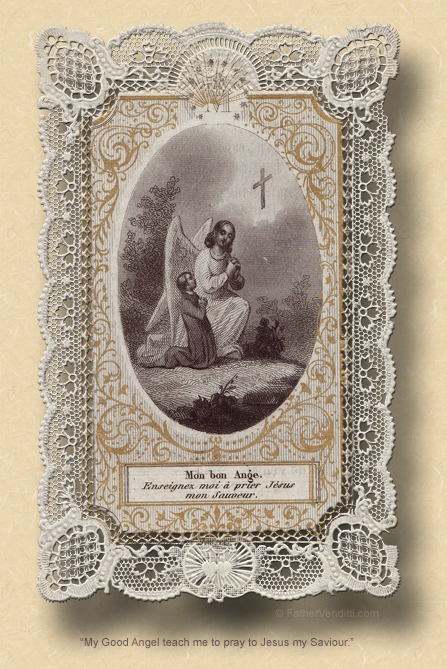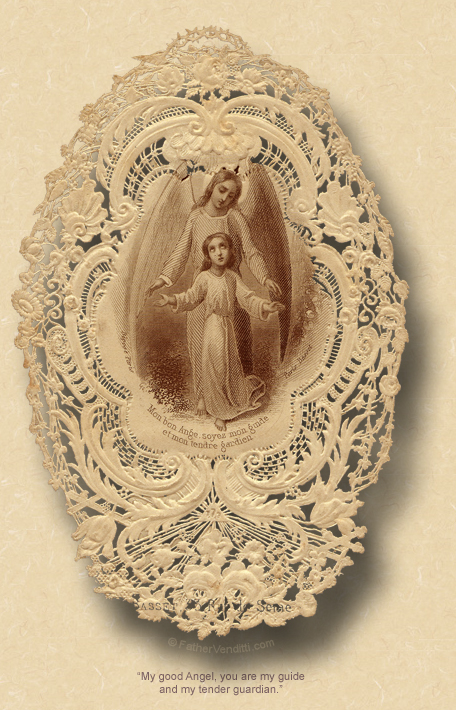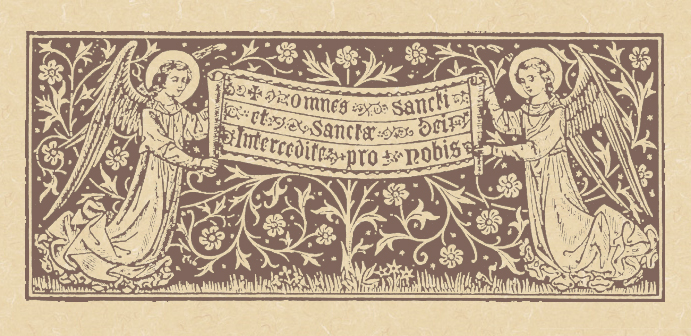Up to Jerusalem.
The Memorial of the Holy Guardian Angels.
Lessons from the proper, according to the ordinary form of the Roman Rite:
• Exodus 23: 20-23.
• Psalm 91: 1-6, 10-11.
• Matthew 18: 1-5, 10.
|
…or, first & second lessons from the primary feria for the Twenty-Sixth Wednesday of Ordinary Time:
• Nehemiah 2: 1-8.
• Psalm 137: 1-6.
…the Gospel lesson from the proper being required.
|
The Third Class Feast of the Holy Guardian Angels.
Lessons from the proper, according to the extraordinary form of the Roman Rite:
• Exodus 23: 20-23.
• Psalm 90 (91): 11-12.
• Matthew 18: 1-10.
FatherVenditti.com
|
 8:37 AM 10/3/2019 — Today we remember and reaffirm our devotion to the Angels, specifically, that particular angel assigned by our Lord to watch over each of us individually. I've always had a special interest in and devotion to the Holy Angels of God, and not simply because I'm named after one of them. As you've heard me say a couple of times, I'm very sensitive to those who attempt to rewrite the Gospel to turn Christianity into some sort of social program, and devotion to the Holy Angels of God pretty much makes that impossible since there are few things found in Scripture more shrouded in mystery and more indicative of the supernatural than the angels. 8:37 AM 10/3/2019 — Today we remember and reaffirm our devotion to the Angels, specifically, that particular angel assigned by our Lord to watch over each of us individually. I've always had a special interest in and devotion to the Holy Angels of God, and not simply because I'm named after one of them. As you've heard me say a couple of times, I'm very sensitive to those who attempt to rewrite the Gospel to turn Christianity into some sort of social program, and devotion to the Holy Angels of God pretty much makes that impossible since there are few things found in Scripture more shrouded in mystery and more indicative of the supernatural than the angels.
And found in Scripture they are in abundance. They are all over the Old Testament, visiting Abraham, speaking to Isaiah, feeding Jeremiah in the wilderness, delivering the Word of God to Ezekiel, and on and on and on. The New Testament, of course, begins with an angel announcing to our Blessed Mother that she would be bringing God into the world in the person of Jesus. Angels announce to the shepherds His birth, they minister to our Lord in the desert and during His agony in the garden, and they appear again to bear witness to His glorious Resurrection.
The Blessed Evangelist John, in the Book of Revelation, takes us back to their origins in a highly symbolic way, recounting how they, too, were created with free will, and how one of them led an insurrection against God, for which he was banished with his minions to hell, and from where he and his followers, known as demons, continue to ply their rebellion against grace by tormenting us with temptations away from the truth. How literally you want to take St. John's narrative is up to you, but the moral truth he reveals to us is a matter of dogma, which is why it's in the Bible. Cultivating devotion to the angels reminds us of an essential fact about the Communion of the Saints, of which the Holy Angels of God, including our Guardian Angels, are a part:  even when we're not thinking of them—even if we've gone for many years without giving them any thought or asking for their help and protection—they're still there, protecting us, praying for us, staying the hand of God's justice when we sin, rejoicing for us with every temptation resisted; and, while it may seem schmaltzy and childish and just a lot of pious pap, I happen to believe that, whenever we fail to meet our obligations in our daily prayers and spiritual exercises, our Guardian Angel finishes the prayers for us. even when we're not thinking of them—even if we've gone for many years without giving them any thought or asking for their help and protection—they're still there, protecting us, praying for us, staying the hand of God's justice when we sin, rejoicing for us with every temptation resisted; and, while it may seem schmaltzy and childish and just a lot of pious pap, I happen to believe that, whenever we fail to meet our obligations in our daily prayers and spiritual exercises, our Guardian Angel finishes the prayers for us.
Yesterday I had used the Scripture lessons from the proper for Saint Thérèse because that Gospel passage was integral to my homily about her, but the ferial day lesson from yesterday actually sets the tone for what would have been the Gospel lesson for today were it not for the memorial, and I want to talk to you about it anyway: “When the days for Jesus' being taken up were fulfilled, he resolutely determined to journey to Jerusalem…” (9: 51 NABRE). Msgr. Knox's translation might even be better, as it clearly transmits the import of the moment: “And now the time was drawing near for his taking away from the earth, and he turned his eyes steadfastly towards the way that led to Jerusalem” (9: 51 Knox).
You understand what Saint Luke is saying to us: Jesus and His friends are embarking on their last long trip to Jerusalem. He's been there many times, but this will be the last trip because after this is Calvary. And Jesus knows it! What the Apostles knew is pure speculation, but the fact that our Lord knew is actually buried in Luke's cryptic choice of words: He was “resolutely determined” to go, or, as Msgr. Knox so poetically puts it, “…and he turned his eyes steadfastly toward the way that led to Jerusalem.” It's not explicitly said, of course—very few things in Luke's Gospel are—but why else make the remark of how determined our Lord was? The disciples, after all, had tried to dissuade Him from going, suspecting all along what would happen there. So did a lot of other people, who begin, at this point, to start to avoid our Lord for that reason; and, that, too, is alluded to in more of the verses from yesterday’s Gospel:
And he sent messengers before him, who came into a Samaritan village, to make all in readiness. But the Samaritans refused to receive him, because his journey was in the direction of Jerusalem (vs. 52-53 Knox).
But, even without the knowledge that we have in retrospect—that our Blessed Lord is God and His death on the Cross is preordained and even intended—there is the account of these three individuals who are not put off by what seems to be our Lord's poor decision to walk right into the lion's den, so to speak, but who are, in fact, attracted to the example of sacrifice; and, it's here, in these three men, that we find ourselves in this episode. After all, we wouldn't be here right now if we didn't have some desire to follow our Lord; but, like the three men in the lesson, we're not all at the same stage of readiness.
The first one seems to be the quintessential disciple: he comes right up to our Lord, unsolicited, and says straight out, “I will follow you wherever you go” (v. 57 RM3). We've seen this before, haven't we? Think back to the Rich Young Man who approaches our Lord (cf. Mark 10: 17-27; &, Matt. 19: 16-22) asking to be part of His company, only the Rich Young Man doesn't know what's ahead, as demonstrated by the fact that he's unwilling to part with his material possessions; but, this man is different: reading Luke between the lines, it seems that, while he may not know the particulars of what awaits our Lord in Jerusalem, he knows it won't be pleasant. Our Lord's mysterious line to him, about foxes having their lairs and birds their nests but the Son of Man having no where to lay His head, is nothing more than our Lord just making sure he understands what he'll be sacrificing. And, as usual, we don't know what he ultimately decides, as often happens in Saint Luke's Gospel: various people cross our Lord's path, He has a brief encounter with them that makes some point or occasions some lesson by our Lord, then they disappear from the narrative, vanishing into thin air, it seems, because, as far as Luke is concerned, the point is made and they've served their purpose. Luke never allows us to get distracted by some human interest story from the spiritual and theological point that's being made.  The Rich Young Man, the rabbi who wants to justify himself, the woman at the well in Sumeria, the man with the son possessed by demons, the centurion with the dying servant, the one leper who comes back to give thanks for his cure: we never hear from them again; they each have their moment with our Lord, then they're gone. Luke denies us the “closure” of knowing what ultimately happens to them because they are not what all these different passages are about. Like the man in the Gospel lesson for today: Saint Luke cryptically alludes that he at least suspects that, upon arriving in Jerusalem, our Lord will be involved in some difficultly of some sort, and he wants to follow anyway. Our Lord's response, highlighting the nature and mystery of the Cross for anyone who chooses to follow the way of Jesus, is more for our benefit than for this man's; and, the Evangelist doesn't bother to tell us what this man decides or what he does because it isn't important. The Gospel is not a novel: it isn't important that all the sub-plots are resolved and all the characters are accounted for. The Rich Young Man, the rabbi who wants to justify himself, the woman at the well in Sumeria, the man with the son possessed by demons, the centurion with the dying servant, the one leper who comes back to give thanks for his cure: we never hear from them again; they each have their moment with our Lord, then they're gone. Luke denies us the “closure” of knowing what ultimately happens to them because they are not what all these different passages are about. Like the man in the Gospel lesson for today: Saint Luke cryptically alludes that he at least suspects that, upon arriving in Jerusalem, our Lord will be involved in some difficultly of some sort, and he wants to follow anyway. Our Lord's response, highlighting the nature and mystery of the Cross for anyone who chooses to follow the way of Jesus, is more for our benefit than for this man's; and, the Evangelist doesn't bother to tell us what this man decides or what he does because it isn't important. The Gospel is not a novel: it isn't important that all the sub-plots are resolved and all the characters are accounted for.
That being said, today's lesson does not end without two more mysterious encounters, two more nameless people our Lord just happens to bump into before they, too, vanish into thin air; but, they are very different from the first fellow. They seem to be anxious to walk along with our Lord as well, but not without conditions; and, the conditions they have seem to us perfectly reasonable: one wants nothing more than to go home and say goodbye first to his family; the other one has a dead father lying at home. We want to ask our Lord what He actually wants here. Does he really want this man to leave his father decomposing on his death bed while he obeys the Lord's command to proclaim the kingdom of God? But notice that Luke, again, doesn't tell us what either of them decides to do. Our Lord says what he says to each of them, and—poof—they're gone. What they do doesn't matter; it's what we do that matters. And it's to that end that our Lord speaks to us the last line of today's Gospel lesson: “No one who sets a hand to the plow and looks to what was left behind is fit for the kingdom of God” (v. 62 RM3).
Each of us could tell the story of our own encounters with our Blessed Lord. And each of us is often tempted to view that story like it was a novel or a television drama, with all the characters accounted for and all the plot lines neatly tied up and resolved. The problem is that the interior life doesn't work that way: the disease of sentimentality, the constant looking backward into the fog of regret: what might have been, what could have been, what should have been. None of it matters. The woman who comes into confession full of regret that she may have treated her husband uncharitably in the last difficult days of his life, or the parent full of regret that the falling away of his children from the faith might have been avoided had he done something different or said something different. Our Lord is not Doctor Phil. He does not offer us closure. He offers us absolution. He offers us Grace. Whatever else we think we need we obtain through cultivating the virtues of Faith and Hope.
Let’s ask our blessed Lord, though the intercession of our Guardian Angels, to grant us those most necessary graces.

|

